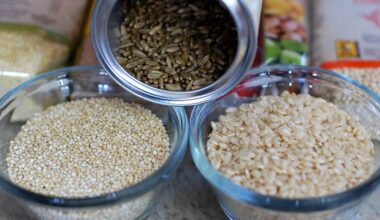Boosting Your Dog’s Immune System During Allergy Season
As allergy season approaches, pet owners may notice their dogs experiencing various symptoms, including itchy skin, watery eyes, and sneezing. These common allergy symptoms can weaken your dog’s immune system, making it crucial to enhance their defenses during this period. Proper nutrition plays a significant role in maintaining your dog’s immune health. Including specific dog nutrition supplements can help build resilience and improve overall wellbeing. It’s essential to consult your veterinarian before introducing any supplement into your dog’s diet and to monitor your pet for any adverse reactions. Especially during high pollen counts, it’s beneficial to focus on their dietary needs. Supplements designed for immune support are widely available and can provide vital nutrients. Enhanced immune function not only helps with allergy resistance but also supports general health throughout all seasons. Remember that a balanced diet, combined with supplements such as omega-3 fatty acids and antioxidants, can offer substantial health benefits for your furry friends. Be proactive in helping your dog cope with environmental allergies by optimizing their immune system now.
During allergy season, it’s essential to recognize that your dog’s diet influences their immune responses significantly. A well-rounded diet rich in vitamins and minerals supports their natural defenses. Consider supplements that contain vitamins such as vitamin E and C, which are known to enhance immune responses. Beta-carotene, found in orange and yellow fruits and vegetables, is another excellent addition. Foods like sweet potatoes and carrots are ideal. Furthermore, probiotics can promote gut health, crucial for a robust immune system. Look for high-quality dog food that incorporates these supplements. Additionally, ensure the diet is rich in protein to support tissue repair and growth, essential for recovery during allergy flare-ups. This approach not only helps manage symptoms but also reduces the likelihood of secondary infections. Whenever introducing new supplements or dietary changes, the gradual transition is vital to avoid gastrointestinal upset. Observing your dog’s reactions during this change can provide important insights into their preferences and tolerances. Always provide fresh water alongside any dietary additions to maintain hydration, especially if allergies cause skin irritations that lead to excessive scratching and thirst.
Understanding the Role of Omega-3 Fatty Acids
Omega-3 fatty acids, prevalent in fish oil, have garnered attention for their immune-boosting properties. These essential fats help reduce inflammation, which is a common issue for dogs suffering from allergies. Inflammatory responses can worsen allergy symptoms, making omega-3s a formidable ally. These fatty acids work by modulating the immune system and providing additional benefits, such as supporting heart and joint health. When considering omega-3 supplements, it’s important to choose high-quality products specifically designed for dogs. Always consult your veterinarian regarding the appropriate dosage, as excess amounts can lead to side effects. You can find omega-3 in various forms, including capsules, oils, or even fish-based dog foods. Additionally, it’s advisable to integrate these fatty acids gradually into their diet to prevent digestive disturbances. Many dog owners report noticeable improvements in their dogs’ coat conditions, skin health, and overall demeanor after supplementation. Always prioritize balancing omega-3 intake with omega-6 ratios to ensure optimal health benefits. Looking for pet products with sustainable sourcing can also enhance your peace of mind regarding environmental impacts, supporting responsible pet care.
Antioxidants are another key component suited for boosting your dog’s immune system. These compounds combat oxidative stress that can result from environmental factors like allergens. Many fruits and vegetables are high in antioxidants, providing nutritional variety alongside necessary vitamins. Blueberries, spinach, and kale can be excellent additions to homemade dog meals or snacks. In addition to providing high levels of dietary antioxidants, numerous commercial supplements offer tailored blends for dogs, helping to simplify the process of enhancing your dog’s nutrition. Incorporating these foods can significantly help manage allergy symptoms, reducing itchiness and other allergic reactions. While some dogs may enjoy fresh options, others might prefer them in a dehydrated or supplemental form. Monitor your dog’s response to new flavors and textures, ensuring a smooth transition without digestive discomfort. Changing their diet, especially during allergy season, should always be approached with care, ensuring a gradual introduction of new ingredients to avoid upset stomachs. Always prioritize whole foods when possible and consult with your veterinarian for tailored products suited to your dog’s unique needs during allergy flare-ups.
Probiotics for Canine Gut Health
Probiotics can play a crucial role in supporting your dog’s immune system and overall health during allergy season. These beneficial bacteria help balance your dog’s gut flora, influencing their immune health directly. A healthy gut can enhance nutrient absorption, build resistance against allergens, and even improve skin health, a common concern for allergy-affected dogs. There are various probiotic supplements available for dogs, which come in forms like powders, capsules, and treats. It’s advisable to choose products specifically formulated for canine needs, as these include strains that effectively benefit dogs. Introducing probiotics gradually into your dog’s diet is essential to establish tolerance and minimize digestive upset. Kibble blended with probiotics is also available, providing an easy way to integrate these beneficial microbes. Monitoring your dog’s health and behavior following probiotic introduction will help gauge effectiveness. Some owners report improved digestion and noticeable fluctuations in energy levels after consistent probiotic use. Ultimately, by promoting gut health, you’re directly aiding your dog’s immune responses. Tailoring this aspect of nutrition to meet your pet’s specific requirements can be a game-changer during heightened allergy seasons.
Regular exercise can also significantly contribute to your dog’s immune health. Physical activity not only helps maintain a healthy weight but also stimulates circulation and boosts immunity. Engaging your dog in daily activities such as walks, playtime, and even dog sports can help them cope with stress, which is sometimes exacerbated by allergy symptoms. Stress can weaken the immune response, making it essential to strike a balance between activity and rest. An active lifestyle combined with immune-boosting nutrition will improve your dog’s resilience to allergens. Whether it’s active fetching or calm strolls, finding the right activities tailored to breed and age is key. In addition to fitness, ensuring that your dog has regular check-ups with your veterinarian can also play a vital role in identifying any underlying health issues that may worsen during allergy season. Keeping your dog’s vaccinations up to date is also essential for enhancing immunity. Maintaining regular vet visits will ensure they remain healthy and can better weather allergy seasons. Through a holistic approach encompassing diet, exercise, and healthcare, your dog’s immune system can be optimally supported.
Creating an Allergy Management Plan
Finally, crafting an allergy management plan is essential for dog owners, especially during high pollen counts. This proactive measure allows for better preparation and response to any allergic reactions your dog may experience. Understanding the specific allergens your dog is sensitive to can guide your approach. Various methods, such as eliminating certain foods or reducing outdoor exposure during peak allergy days, can improve conditions. Consulting with a veterinarian can yield personalized strategies, including which supplements to include for immune support. Keeping a watchful eye on your dog’s symptoms during allergy season can lead to insights regarding effective management practices. If symptoms worsen, don’t hesitate to seek professional advice promptly. Regular follow-ups with your vet ensure that your management plan is effective and can be adapted based on your dog’s feedback. Incorporating both dietary strategies and lifestyle adjustments into your management plan equips you with the knowledge needed for maximizing your dog’s health during allergy season. Ultimately, this concerted effort will not only alleviate discomfort but also enhance your dog’s overall quality of life.
In summary, maintaining your dog’s immune system during allergy season is crucial for their health and wellbeing. By understanding the nutritional needs and incorporating appropriate supplements, pet owners can help their pets navigate these challenging times. Omega-3 fatty acids, antioxidants, probiotics, and regular physical activity contribute to a holistic approach to immune system support. Always discuss changes and additions to your dog’s diet with a veterinary professional to ensure their specific needs are met. By crafting an informed allergy management plan, ensuring balanced nutrition, and prioritizing health check-ups, you can make a significant difference in your dog’s response to allergens. It’s vital to be proactive, as early intervention often leads to better outcomes. With careful consideration and a dedication to your dog’s health, you can enhance their quality of life. Remember that consistent observation and adjustments to their diet and activity levels can lead to improved results. Your furry friend deserves the best, so investing time in understanding how to support their immune systems is worthwhile. Ultimately, a comprehensive approach will contribute to a happier, better season for both you and your dog.


